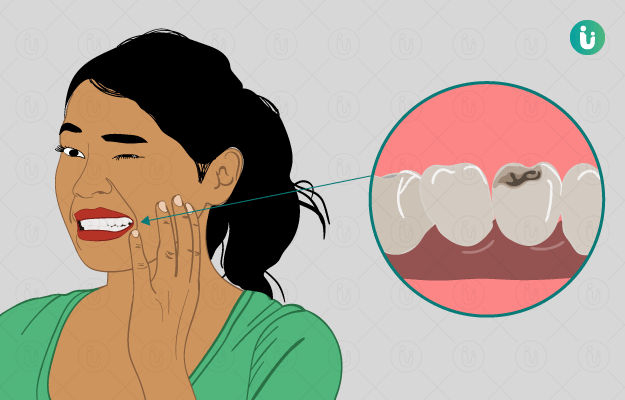What are dental caries (cavity)?
A dental or tooth cavity is a hollow space formed in the tooth due to alternate demineralisation and remineralisation of the tooth structure. Dental caries is a biofilm-driven, sugar-dependant disease that can occur at any age.
Caries can occur in both milk teeth (primary dentition) and permanent teeth (secondary dentition), resulting in the structural damage of the tooth.
Around 32% of the world population is affected by dental caries, making it the second most common disease after common cold.
What are its signs and symptoms?
The following are the signs and symptoms of dental caries:
Early signs include
- Sensitivity to hot and cold foods
- Pain or discomfort on biting
- Tooth discolouration
Late symptoms include
- Swelling of gums
- Continuous unbearable pain
- Night pain
- Grossly broken teeth
Occasionally, you may experience no pain at all and may be surprised when your dentist finds a cavity in your teeth.
What are its main causes?
Cavity is caused by the bacteria present in the mouth, which attach to the teeth in the presence of sucrose, other sugars, and refined starches. These bacteria produce acid and erode the enamel, which is the strongest layer of the tooth.
Streptococcus mutans and Streptococcus sobrinus are the main bacteria responsible for dental caries.
Nursing bottle caries occurs when the baby is fed with sugary milk at bedtime.
How is it diagnosed and treated?
- A dentist will first examine the oral cavity with the instruments, i.e., visual and tactile inspection.
- If needed, the dentist may take a radiograph to confirm the visual inspection.
- At the end, after correlating the findings with the patient’s symptoms, the dentist may suggest a treatment plan.
- Depending on the extent of the cavity, the dentist may decide the procedure.
- Early treatment – Fluoridated varnish application may help in re-mineralising the enamel.
- In the later stages, the tooth needs to be restored with a filling or a root canal treatment, and in severely decayed cases, the dentist may extract the tooth.
- There may be fever associated with dental infections, such as abscess
- However, self-care, including having a nutritious and low sugary diet, is very important.
Differential Diagnosis
- Initially, a white spot develops on the tooth indicating demineralisation. However, these white spots are sometimes intrinsic in nature, and this condition is known as dental fluorosis.
- The tooth may get discoloured due to trauma as well. Hence, discolouration of a tooth does not always indicate a cavity.
- There may be staining of pits and fissures due to tea and coffee. Hence, a dentist would first visually inspect before deciding on the treatment plan.
The duration of treatment may vary depending upon the length of the treatment. With recent technological advances, single sitting treatment plans are also possible. A dental treatment may get painful but rarely. Often, treatments are performed under local anaesthesia to give a painless experience. Caries might be treated by applying a fluoride gel or the teeth are filled using a filling. If it is deep, it might be cleaned and covered with a dental crown. If it is severe, the decayed tooth might need extraction.
Home-care remedies to prevent dental caries are
- Twice-daily brushing
- Use of fluoridated toothpaste
- Regular self-examination of teeth
- Use of mouthwash
- Reduced in-between meals

 Doctors for Cavities (Dental Caries)
Doctors for Cavities (Dental Caries)  OTC Medicines for Cavities (Dental Caries)
OTC Medicines for Cavities (Dental Caries)



















